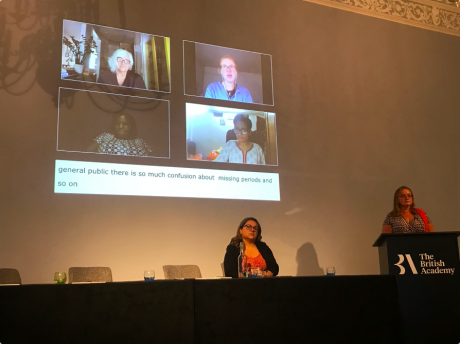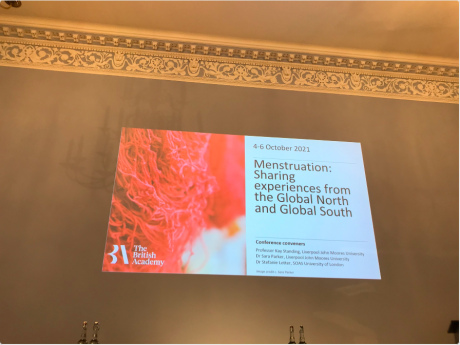Reflections on the 'Menstruation: sharing experiences from the global north and south' conference1
Written by Sophie Collins, PhD researcher at the Institute of Development Studies (IDS) at the University of Sussex and CORTH member.
8th December 2021
Sophie’s doctoral research is supervised by Dr Hayley MacGregor and Professor Maya Unnithan. Sophie started her PhD in September 2020 with the IDS, researching the framing of menstrual health in policy, with a particular focus on Kenya and the UK.
The British Academy
04-06 October 2021
Past info - Menstruation: sharing experiences from the global north and south | The British Academy
Conversations around menstrual health are becoming increasingly visible, in policy, traditional mass media, and social media. On the 4th – 6th October 2021 the British Academy hosted the conference Menstruation: sharing experiences from the global north and south, which focused on the representation of menstruation and menstrual stigma across a range of disciplines, geographic areas, and menstruators’ experiences. This brought together academics, activists, artists, programme implementers and policy makers, to explore the many ways menstruation is represented. This hybrid in-person and online conference brought together experiences from the global north and global south to share knowledge, experiences, and form connections.
Key conference messages
The conference was split over three days and into nine sessions. Each of the nine sessions addressed a different topic, and we heard from a rage of speakers on these topics, always with an opportunity for in-person and online audience Q&A after2. While each of the nine topics covered a specific area, I felt there were three key themes that cut across each of these which stood out as the main takeaways of the conference. These were sustainability, language, and representation.
Sustainability
Sustainability was the focus of two of the nine sessions as well as a cross-cutting theme through the conference. There were conversations on; reusable menstrual products, the role of the private sector in promoting reusable and disposable products, and the differences in product preference between regions. The discussions on reusable menstrual products stood out as ethics and environmental consciousness were highlighted to be impacting on the way those who menstruate make decisions on how “manage” their own menstruation. It was insightful to hear the conversation between the global north and global south on this topic. Dr Supriya Garikipati (University of Liverpool), spoke about the rise of the disposable pad in India in the 1980s and how this was associated with aspirational ideas and wealth. This in turn has led to an irony in the global south, where reusable pads which are seen as an older practice, are now being promoted as a ‘modern’ alternative. Dr Garikipati quoted that 85% of the world’s menstruators are living in the global south, which is leading to a “sanitary emergency”. The solution is the active promotion of reusable products in the global south which will require further discussion with women about their own preferences and why.
Other sessions highlighted how reusable products are on the rise, globally. The role of the private sector was prominent in several aspects, such as their role in the promotion of reusable products, as well as hearing from Lucy Nkhoma (Malawi Girl Guides/ The Menstrual Cup Coalition) on the promotion of the menstrual cup in East Africa, which was discussed as one of the most environmentally sustainable menstrual products. We also heard from the founder of WUKA Wear, Rubina Raut, who developed the UK’s first period underwear. In all of these conversations, while hearing positive messages about the possibilities for the future environmental sustainability in menstrual products and the expanding opportunities for women to make more conscious decisions on their own products, the challenges of taboo, stigma, cost, and availability of these were highlighted as present barriers.
Language
The theme of language was about how we collectively speak about menstruation and what impact that has on the collective imagination of what it means to menstruate. Professor Chris Bobel (University of Massachusetts Boston) opened the event with her talk on “What we talk about when we talk about menstruation”. This set the scene in which we were made to question our own framings of menstruation and how it is made into a “spectacle”. This refers to how a period is no longer viewed as a natural part of human life, but a feature of a girl, made into a crisis that needs to be solved. Professor Bobel argued that this also leads to a distorted view of a dependent needing saving, which in turn leads to menstrual hygiene management (MHM) campaigns that inspire pity, generally for the purpose of securing funding. We were asked to think, what do menstruaters really need which is not being spoken about? The answer: pain relief and a culture of menstrual support. It means to stop looking at menstrual products as a silver bullet solution. This message was reiterated in the discussion on “Call a Period a Period” (Janie Hampton, Menstrual Cup Coalition), in which we looked at how euphemisms around menstruation in the public, in research and programmes (such as MHM) work to reinforce the stigma and taboos around periods, by making them hidden or separated into a specialised bubble.
The importance of language was also discussed in relation to menstrual health research and policy, specifically on how definitions of “menstrual health” can be a useful tool in defining specific desired outcomes. The definition of menstrual health by the Global Menstrual Collective3 was said to go beyond the idea of hygiene and addresses menstruation in relation to health, across the whole cycle and life-course of women, as well as their social and mental wellbeing. This led to discussion on what is happening in policy in relation to menstrual health, research priorities, and how to determine the indicators of what is important when measuring progress towards better menstrual health outcomes.

Representation
The topic of representation covered disability, age, transgender, geographic and socio-economic backgrounds. We heard how there is very little evidence on disabled women’s experiences of menstrual health, and especially how these differ depending on the impairment. The main issues arepoor information dissemination to disabled girls about menarche, lack of interventions, lack of accessibility in public spaces, and lack of information or support to caregivers. While we heard from two interventions in Nepal who are working on this topic, it appeared that still the research and intervention base here is woefully low.
Typically, when thinking of menstrual health, menstrual education, or the challenges in menstrual experiences, the discussion rarely focuses on menopause. Menopause was not covered extensively in the conference, but this perhaps led it to stand out more as an area which required more attention and greater representation. We heard about the menopause cafes, the pop-up events that allow for open conversations about menopause. For those in the UK, we were pointed in the direction of the British Menopause Society, where women can find a specialist to help them discuss specific challenges they are experiencing. There are other areas around representation that I feel could have been covered in more detail, particularly trans experiences of menstruation. This was touched upon in the discussion on menopause, for those who have undergone sex reassignment from female to male, and how they experienced menopause in this process, however a wider conversation on trans experiences of menstruation would have added to the discussion on representation and menstruation.
Final thoughts
From this event, I feel there were two key takeaways; the first is what Professor Bobel opened the event with – how we talk about menstruation matters. This is in terms of the policy definitions, the euphemisms, the framings, and associations. This helps us to see who is and is not being represented, and to clearly know what we are talking about when we talk about menstrual health. It became apparent through the conference that research and conversations around menstruation are becoming more open and holistic, but there is also a need to ensure underrepresented voices and experiences are reflected further. The second key takeaway is around the benefits of having a joined up global network to share resources, research, build connections and collaborations and mostly to share experiences. For those reading who would also like to know more or would like to be a part of future events or join the conversations, I have provided some resources below.
Resources:
British Menopause Society (UK) - British Menopause Society | For healthcare professionals and others specialising in post reproductive health (thebms.org.uk)
Conference information - Menstruation: sharing experiences from the global north and south | The British Academy
Dignity without Danger - Dignity Without Danger | Liverpool John Moores University (ljmu.ac.uk)
The Menopause Café - Gather to eat cake, drink and discuss menopause (menopausecafe.net)
Menstrual Cup Coalition - Welcome - Menstrual Cup Coalition
Menstrual Health Hub - Menstrual Health Hub - Strengthening the global female health ecosystem. (mhhub.org)
1The event was developed and led by the team from Dignity without Danger (Dignity Without Danger | Liverpool John Moores University (ljmu.ac.uk)), a project that focuses on Nepalese women and girls’ rights to menstrual dignity. It is funded by the British Academy though the Global Challenges Research Fund Sustainable Development project and ran from September 2018 until December 2020.
2A link to the event can be found here, which contains a conference programme (Menstruation: sharing experiences from the global north and south | The British Academy).
3Menstrual health is a state of complete physical, mental, and social well-being and not merely the absence of disease or infirmity, in relation to the menstrual cycle. (Hennegan J, Winkler IT, Bobel C, et al. Menstrual health: a definition for policy, practice, and research. Sex Reprod Health Matters. 2021;29(1):1911618. doi:10.1080/26410397.2021.1911618)

